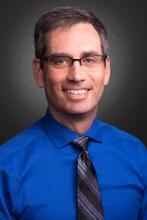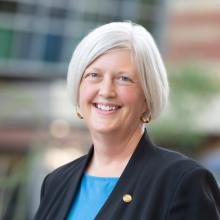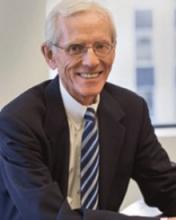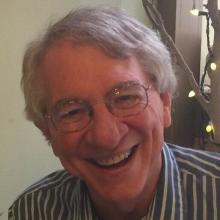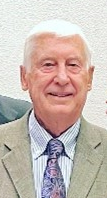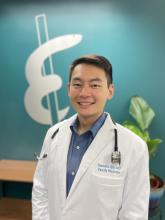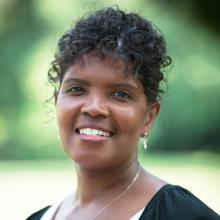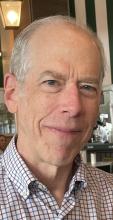Wisdom of Practice is a series of initiatives advancing the understanding, practice, education, and policy of integrated, personalized health care.
The Oral History Initiative - conversations with front line clinicians and policy makers - sheds light on the past, present, and future of private practice and its role in making personal doctoring possible. By capturing clinicians' rich lived experiences, this initiative brings to life changes in health care delivery over more than half a century and informs the future of medical practice.
This page includes an overview of interviews completed to date by the Center for Community Health Integration (interviewer: Robin Gotler, MA). Full transcripts of the Wisdom of Practice oral history interviews will be available through Case Western Reserve University's Dittrick Medical History Center (details to be announced).
Oral Histories in Brief
John Brady, MD, Newport News, Virginia
May 1, 2023
Summary: John Brady shares his perspective as a long-time independent solo family physician and an active participant in primary care policymaking.
When Dr. Brady established his solo practice in 2004, the "Ideal Medical Practice" model was gaining traction. By greatly reducing overhead, utilizing available technology, and focusing on relationships rather than volume, Ideal Medical Practices aimed to increase patient access, care coordination, and physician autonomy. Dr. Brady's practice embraced this model at a time of rapid consolidation and corporatization in health care. In this interview he reflects on his experiences as a solo physician and practice owner, alternative practice models, the implications of how we define and measure quality of care, the decline of small practices, the value of practice innovation, and the importance of challenging healthcare's status quo.
Excerpts:
In [our] practice...there wasn’t an administrator saying...'you’ve got to crank it up, man.' I was accepting a lower salary intentionally so that I could spend more time with people…it really was refreshing… I felt like what we were doing was special."
"…[T]he biggest shift...in the past 15 to 20 years is, in the search for quality we’ve moved towards consolidation, toward larger groups, and I worry that...many patients nowadays have no idea what it’s like to have a high continuity practice, or to have really good access without having to go to urgent care...and so that’s my concern: is primary care...potentially dying because we’ve lost what our fundamental purpose is?"
"If it’s your own practice and your name is on the door and you’re the owner of it, you’re going to go the extra mile, and I think that’s what’s lost. When you start losing the independent practices, you also start losing some interesting innovations…. At a time that we know the healthcare system is failing...in many different ways, this is the time that we need to really challenge processes."
Jennifer Brull, MD, FAAFP, Fort Collins, Colorado
August 10, 2024
Summary: Jennifer Brull has brought a desire for both autonomy and collaboration to her career as a solo physician-practice owner and in her role in a company that helps primary care practices form accountable care organizations.
Family physician Jennifer Brull, MD, spent 20 years in a uniquely structured independent – yet cooperative – practice in Plainville, Kansas. The umbrella practice, formed under an Organized Healthcare Agreement, allowed Dr. Brull to own and run her solo practice under the same roof, and with shared resources, with four other practices. Most recently, she is Vice President of Clinical Engagement for Aledade, which helps geographically disparate primary care practices form accountable care organizations, and, at the time of the interview, incoming President of the American Academy of Family Physicians. Dr. Brull shares her practice’s journey to quality improvement, greater efficiency, and value-based care, as well as her reflections on the future of family medicine and the evolving role of technology in practice.
Excerpts:
“[The other practices in the umbrella organization were by themselves], I was by myself…and that enabled us to each have the flavor that we wanted, but we operated symbiotically. So we shared staff, supplies, space, but we each got to say, ‘I’m gonna work the hours I want to and see patients at the rate that I want to'... being able to both define things that were important to each of us individually and have this support network where we all helped each other was the sweet spot, the best combo.”
“Once we had an EHR and we could pull data, we all did. We had what I always call “coopetition,” it’s like collaboration with a little bit of competition in there.”
“Not everybody should be employed. Not everybody should be in private practice. Both are important. For some family docs, man, it is the best thing ever for them to have a job. ‘I am employed. I have a salary. I know the rules...’ And then there are folks who feel very constrained by those rules… for some folks, it really chafes…I think the DPC (Direct Primary Care) movement is incredibly encouraging. It lets people move to a very autonomous and empowered setting that seems to work across urban, rural, inner city…and lets them have every slider bar of control and be financially successful. It’s hard work, but it is work that they want to do.”
Larry Green, MD, Denver, Colorado
March 7, 2022
Summary: Larry Green is a family physician with extensive experience in family medicine, practice-based research, and health policy.
Framed by his childhood in Ardmore, Oklahoma and the experience of having a local family doctor, Dr. Green views medicine, particularly family medicine, as a calling. His experiences include formative training at one of the country's first family practice residency programs, rural practice, serving as a department chair at a pivotal time of change, and leading his discipline's first policy research center in Washington, DC. His story sheds a personal light on the US healthcare's profit focus; the future of the medical profession; the importance of having a personal physician; academic family medicine; the rise of large hospital systems and loss of control of practice; curriculum innovations; policy issues; the importance of measuring what matters; and the importance of mentors and professional and personal support.
Excerpts:
"[My family doctor growing up] ...was involved with my mother’s health care, my dad’s health care, and he knew my sister, and he had been in our home. He had been in my grandparent’s home. He didn’t need a record of our social determinants."
"...[I]n a capitalistic world with venture capitalists buying up practices and the fundamental purpose being to meet shareholders’ expectations or to retrieve the investment as quickly as possible...when those owners take charge of telling doctors what they can and can’t do, now that’s the end of medicine as a profession..."
"The core problem [in healthcare] is this: is the purpose of medicine to heal people, to relieve suffering, to place the interest of someone who’s frightened, scared, or very sick ahead of your own? If that’s its purpose, then that’s an ethical undertaking."
William Miller, MD, MA, Allentown, Pennsylvania
June 15, 2023
Summary: As both an anthropologist and a family physician, Will Miller has been intimately involved in healing, innovation, private and system-owned practice, medical education, residency training, and family medicine administration.
Dr. Miller's path has included many stops, in locations from Pennsylvania's Lehigh Valley to a one-room schoolhouse on the island of Utila. In this interview, he shares his experiences as a physician, educator, administrator, pioneering qualitative researcher, and parent, as well as his work to help transform an increasingly standardized healthcare system by focusing on generalism, relationships, place, resilience, and adaptation.
Excerpts:
"[Y]ou’re never in balance [as a physician in independent practice], but you can compose a life, a coherent life. You can honor and respect all those parts of yourself if you’re willing to sort of mix it up and pay attention to all of them. You do need to set some boundaries, but you also need to make them permeable."
"We won’t find [good relationships] in healthcare if we can’t find them anywhere else. Healthcare isn’t gonna be the last place they’re saved, but as long as they exist, they’ll find their way into health care, too...we need to keep preparing people who know how to recognize that and make it happen."
"Generalism is ... a way of being present to the world in how we see, understand and make sense...[I]n private practice, it’s easier to preserve generalism. As an employee in a system that knows nothing but standardization and mechanism, it may be impossible, where you’re being measured for all the wrong things and held so powerfully accountable to where that ability to maintain your identity that sets a purpose can become really hard..."
Sherrod Morehead, PhD, Bluffton, South Carolina
May 4, 2022
Summary: Sherrod (Dick) Morehead has had a wide-ranging career as a clinical psychologist, researcher, and pioneer in establishing independent multi-specialty practice in Northeast Ohio.
Although Dr. Morehead's interest in clinical psychology was set at an early age, it wasn't until he was in his first clinical psychology job, in Cleveland, Ohio, that the business of medical practice became an urgent concern. In 1973 - a time when clinicians in academia were almost exclusively employed by hospitals - he and colleagues who were dissatisfied with the status quo established an independent, comprehensive, multi-specialty outpatient medical center. Their move was well-received by local residents and the business community, but not the medical establishment. As a medical center leader for more than 50 years, Dr. Morehead had a front row seat to the inner-workings of healthcare including the centralization of practice, the evolution of managed care, the joys and challenges of private practice, and the importance of ongoing relationships with patients and colleagues.
Excerpts:
"What [health care] really amounts to [now] is something very simple: a doctor...signs an employment agreement...He delivers, she delivers X, Y and Z over A, B, C time at 1, 2, 3 volume. That’s the contract. If you don’t make the contract, you’re penalized. So you have a health factory, and, unfortunately, the health factory defines you as a “provider” (equals “employee”) and it’s killing professionalism."
"...[W]hen you’re seeing one doctor after the next, it’s an information exchange, it’s not a relationship. And I can assure you that a huge part of the healing process is determined by the relationship."
"...[Y]our colleagues play a huge role in treating your patients...we’d be standing at the coffee pot...and somebody would say, '...Here’s what’s going on. What do you think about this?' And inevitably, somebody would say, ‘I’ve seen that before, too. Here’s what I think it is,’ and that takes five minutes, and the patient benefits enormously..."
Kenneth Qiu, MD, Midlothian, Virginia
August 17, 2022
Summary: Kenneth Qiu is the founder of EuDoc, a Direct Primary Care (DPC) practice, and a champion of the DPC movement.
When Dr. Qiu discovered DPC as a fourth-year medical student, he saw it as a path to combine his interests in policy, innovation, and the business of healthcare. Now, in light of those interests, and as a practice owner, he considers both local and large-scale issues: the processes of establishing and organizing a DPC practice, community and business relationships, potential practice innovations, the challenge of defining primary care, and insurance/payment issues including the limitations of employer-based insurance. He also looks to the future and ways to optimize chronic, acute, and mental health care.
Excerpts:
"…I get to think about innovation all the time…‘What’s out on the market? How can I make the membership more valuable for my members? How can I extend our clinical abilities…through new AI technologies or new devices…?’ …[T]hese are things that…primary care docs generally don’t think about because they’re so busy just trying to get through their 40 patients."
"…I think the technology has evolved, the medicine has evolved, but because our payment structure hasn’t, our payment structure is still archaic, it drags everything down with it."
"…[A] lot of this idea of Direct Care and putting primary care back at the helm is to say… ‘How do we make [primary care] better...so that we’re the ones…making the decisions?’ because I think we need to stop giving away ground...[W]hen we take over these processes and these operations, I think we can make it better."
Karen Smith, MD, Raeford, North Carolina
October 13, 2024
Summary: Dr. Smith has dedicated her career to caring for the people of Raeford, North Carolina and advocating for the needs of physicians in independent practice.
Karen Smith never expected that her 3-year, post-residency commitment to practice in rural North Carolina would become a lifelong mission. But more than 30 years later, she remains an integral member of the medical community in Raeford, a town of fewer than 5,000 people. Dr. Smith practiced at a Rural Health Center and in a system-owned practice before starting an independent solo family medicine practice in 2003. To help address the challenges of independent practice, she has been an early adopter of practice innovations and an active participant in organized medicine, where she advocates for the value and future of independent practice.
Excerpts:
"It doesn’t matter if you’re an independent practice owner or an employed physician...you will have some responsibilities in regards to that business…Either you’re going to be the provider of service, [which] has impact in terms of the business operations…or you’re going to own your own business. So the question becomes, whose pains do you want to take on: that [health care system’s] or your own…"
"…my concern is that not all of our organized [medicine] entities are hearing the desperation [of] independent physicians... it takes more than the voice of one independent doctor to say, ‘I am struggling.’ It takes that organization to…see that the number of independent physicians is declining, and recognize independent practices are needed to service these communities."
"It’s the relationships that I’ve built…and understanding what it takes to provide service for folks in this community. Only the independent physicians have the ability to do that. I’m not saying we’re the only source of care, but we have the ability to say yes."
Richard Weinberger, MD, Beachwood, Ohio
July 16, 2025
Summary: As both an independent family physician and an insurance company medical director, Richard (Dick) Weinberger brought a unique, change-oriented perspective to a turbulent era in healthcare.
Dr. Weinberger opened his independently-owned family medicine practice in a Cleveland, Ohio suburb in 1984, just as managed care was taking hold. In the almost-four decades that followed, rather than fight healthcare change, he embraced it as an intellectual challenge. In addition to caring for a growing panel of patients, he served as a part-time insurance company medical director and, with his partner, participated in multiple quality improvement programs, alternative payment projects, and practice transformation initiatives. In this interview, he reflects on adapting to change and the privilege of caring for patients over time.
Excerpts:
"[Private practice] was great...and I really appreciated it. There was some extra work: on weekends you had to pay the bills...you had to get estimates for repairs... but I didn't mind it...I thought the advantages of being in private practice far outweighed the disadvantages."
“[Working part-time for an insurance company, beginning in 1993,] allowed me to learn what was going on…to try to wend our way through all this. It was an opportunity, and we always felt like if there was something new, we were going to see what we could do with it. So when there was managed care, we kind of embraced it. We thought it might be a way that primary care/family medicine could show themselves as being true managers of patients’ health, total health.”
“I think practices should be independent. I feel like…patient service-wise, it makes the most sense because I think you're more invested in being available and providing the best service when you're a part owner, at least…[M]y receptionist… was twenty feet away from me. So she could walk down and say, ‘Hey, it's 4:45... Mr. Smith has a sinus infection. He's going out of town tomorrow and he just wonders if you can fit him in.’ And you think, ‘Well, this is going to take five minutes…Yes, just fit him in.’ And it wasn't even that I was thinking, ‘Oh, this is another patient that I can get reimbursed for.’ It was really, ‘This is what I'm here for….’ "


